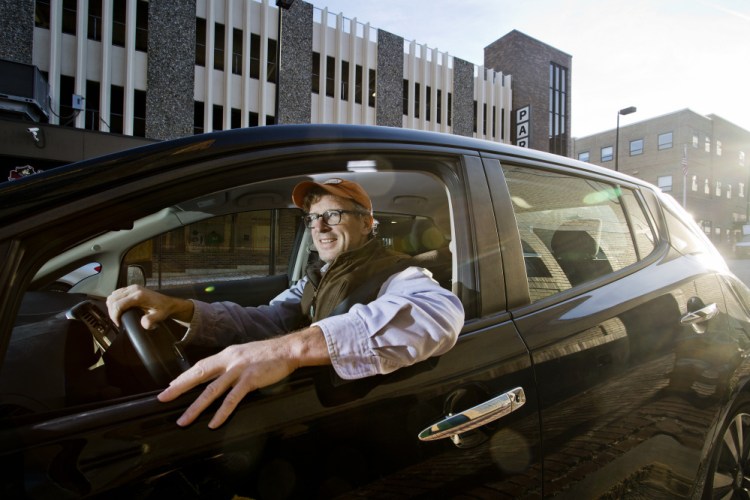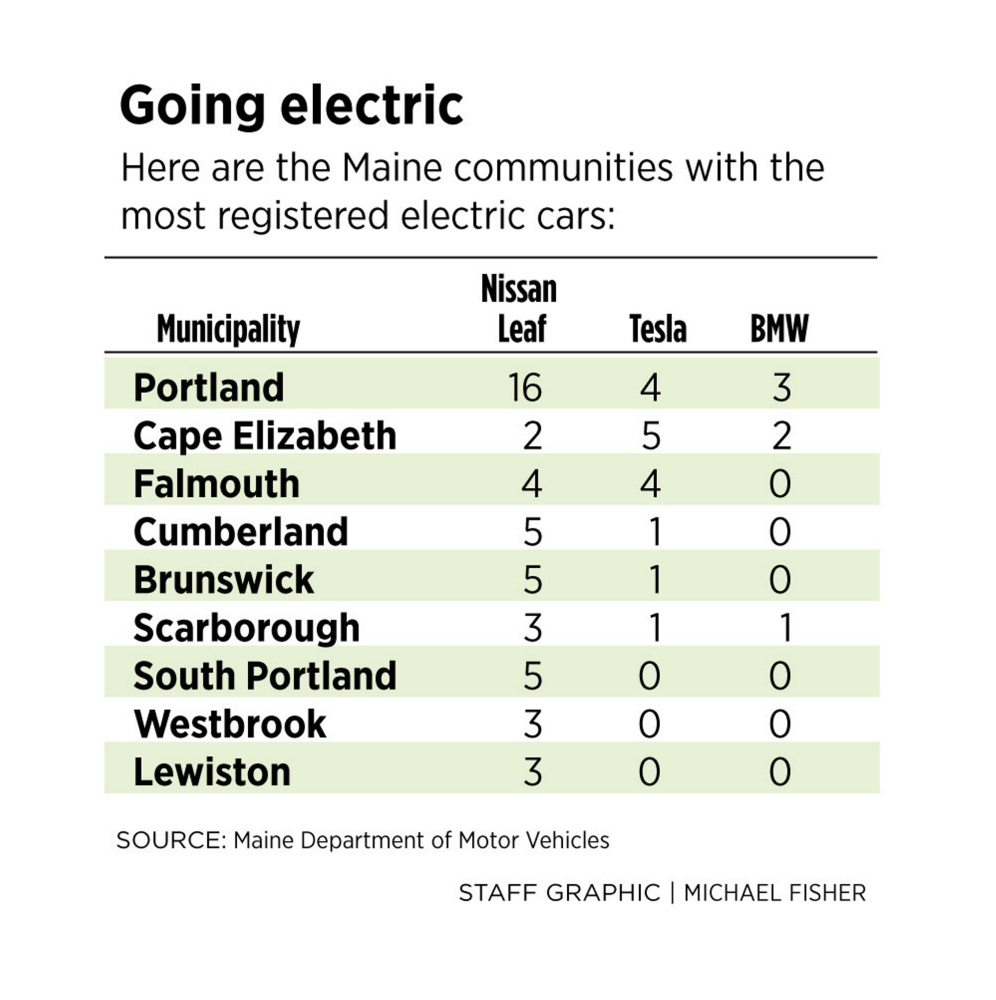Maine drivers inspired by last week’s climate talks in Paris can make a meaningful impact by swapping their ride from gasoline to electric. But so far, few are pivoting from the gas pump to the power outlet.
Figures show there’s a clear disconnect between what Mainers want to drive and what advocates say they will need to drive to limit so-called greenhouse gases.
Nearly a quarter of the new cars purchased this year in Maine were small sport utility vehicles, according to the Dominion Cross-Sell Report, which tracks sales and registration data. When pickup trucks and SUVs are added together, they account for nearly 60 percent of new vehicle sales this year in Maine.
Battery-electric cars and plug-in vehicles that also have small gasoline engines account for less than 1 percent of the 46,011 new cars registered in Maine as of Sept. 30.
Cars and trucks are in the cross hairs because they are the second largest source of carbon dioxide emissions in the United States, behind power generation. Transportation is the leading source of the heat-trapping gas in Maine, spewing out more than half of all energy-related CO2 emissions, according to the U.S. Energy Information Administration.
Environmental advocates say we need to slash transportation-produced gases by 80 percent nationally to hit science-based reduction targets. In a rural state like Maine, that goal simply can’t be met without a transition to electric cars.
The experience at some Nissan dealers in Maine points up the challenge of making that switch anytime soon.
Environmental advocates want us to drive cars such as the Nissan Leaf, which the Cross-Sell Report says is tied with Tesla for the top-selling all-electric vehicle in Maine. But many more people want to drive the Nissan Rogue, a small SUV that’s among the 10 best-selling vehicles in Maine. A total of 1,101 new Rogues were registered in Maine as of September, compared to 13 new Leafs.
The Rogue is a four-door crossover. There’s room for a family. Plop the rear seat down and go to the dump. Buy one with all-wheel drive and go in the snow. A four-cylinder engine and advanced transmission eke out a decent 28 miles to the gallon overall, and a sticker price starting at $20,000 puts the Rogue in reach of many families.
“The Rogue has everything we need in Maine for getting it done,” said Nick Elwell, general manager at Bill Dodge Nissan in Saco.
The dealership sold 20 Rogues in November, compared to two Leafs, a typical ratio. Elwell said he’d like to sell more Leafs, but that Maine consumers don’t yet have enough confidence in electric vehicles.
One buyer who expresses that view is Darcy Emerson, a teacher from Nobleboro who bought her Rogue at Lee Nissan in Topsham in early 2013. It was a year old and had about 25,000 miles on it. She said she was drawn to that vehicle because it looked and drove like a car, but had the space of a small SUV or minivan.
“I see a lot of them on the road,” she said. “But maybe it’s because I have one now and I just notice it more.”
Emerson said she’s never considered an electric car, in part because she doesn’t know much about them. What she does know – that they need to be charged often – turns her off.
Emerson and her husband drive to Virginia to visit their adult son and grandchildren. If they drove an electric car, they would likely need to stop and recharge a half-dozen times or more each way.
“Gas mileage is very important to me and I think (the Rogue) does really well,” she said. “But an electric car, I don’t think that’s for me.”
•••
But environmental groups want us to start driving cars like the Leaf.
The Leaf can seat five people. It has front-wheel drive and a roomy hatchback. The ride is on par with a typical compact car, but living with the Leaf takes some planning. The basic model has a range of 84 miles; upscale versions can go 107 miles before they need to find a charging station and, yes, there’s an app for that.
Fuel efficiency, though, is off the charts – an electric equivalent of 114 miles per gallon with zero emissions. It’s based on a new rating called MPGe, which is how the Environmental Protection Agency calculates the amount of electric energy equal to the energy contained in a gallon of gasoline.
Lee Nissan in Topsham actively promotes the Leaf. It has a model displayed in the showroom and a charging station in the parking lot.
This commitment hasn’t translated into sales. The company has sold 10 Leafs so far this year. That’s more than half of all the Leafs sold in Maine, but a fraction of 1 percent of sales, compared to the top-selling Rogue.
The Leaf really isn’t sold, either, as most people lease them for two years, for $275 a month. Most Mainers can’t plunk down between $30,000 and $35,000, even though a federal tax credit will slice $7,500 off that sticker price. Increasingly, though, they are buying used Leafs for $13,000 or so.
•••
For Don Tuski, the decision to drive a Leaf came last year after a visit to ReVision Energy in Portland, where one of the company’s co-owners, Phil Coupe, has one. Tuski had been thinking about an electric car to cut carbon emissions, he said, and eventually would like to charge his vehicle with solar panels. He drove Coupe’s car and was impressed.
“The next day, I’m leasing one from Lee Nissan,” Tuski said.
Tuski, president of Maine College of Art, lives in Portland and has a short commute to work. The farthest from home he has driven is to Pineland Farms in New Gloucester, which has a charger.
When Tuski does stray out of the city, he uses the smartphone app to locate charging stations. He was caught off guard one evening, though, on a trip to Cape Elizabeth, to find the station at the South Portland Recreation Center not working. But the Leaf had a 30 percent charge, and he got home.
To take a long trip, he either borrows or rents a standard car.
“Right now, the rub is you really have to have access to another vehicle,” he said.
The biggest obstacle to getting more electric cars on Maine roads, Tuski said, is the dearth of charging stations, especially the so-called Level 3 units that can fully charge a battery in less than 30 minutes.
•••
The number of battery-electric models, such as the Nissan Leaf and BMW i3, and plug-in electric hybrids, such as the Chevrolet Volt and Ford C-Max Energi, is expanding rapidly. But the rate of sales growth nationally seems to be slowing this year compared to 2014, according to data collected by Inside EVs, which reports on the vehicles. Sales peaked at 123,049 last year, but have reached only 92,347 through October of this year, according to a monthly sales scorecard.
There’s debate in the industry about the impact of low gasoline prices on electric vehicle sales. But as climate change gains greater public attention, environmental groups are ramping up their promotion of electric cars as part of an urgent campaign to slash carbon emissions.
Last month, five states and the District of Columbia announced a transportation and climate plan to develop a clean energy economy and reduce carbon pollution from the transportation sector by between 29 percent and 40 percent by 2030, in line with a report from the Georgetown Climate Center.
Also last month, the Conservation Law Foundation, the Sierra Club and the Acadia Center released a report called Charging Up that outlined policies that both government and the private sector in the Northeast could do. These included building more charging stations, offering more financial incentives and better marketing and promotion at dealerships.
But the report also acknowledged a large gap between state goals and the current rate of electric vehicle adoption. The gap is very big in Maine, which is among five states in the Northeast and mid-Atlantic that declined to sign a memorandum of understanding two years ago to put 3.3 million zero-emission vehicles on the roads by 2025. The report estimated that Maine has 263 zero-emission vehicles now, and would need 3,155 in 2017, and 50,906 to meet the multi-state target in 2025.
Targets like these, said Ben Tettlebaum, a staff attorney at the Conservation Law Foundation’s office in Portland, have a chicken-and-egg dynamic. California leads the nation in cleaner-car mandates. It recently set a new goal for dealers to make zero-emission vehicles – which can include plug-in hybrids – 15 percent of their sales by 2025. Maine could boost market demand by building more charging stations and offering a state rebate, he said, and by having dealers market electric vehicles the way they now promote trucks and SUVs.
“We think there’s an opportunity to shift the numbers,” he said. “Some of it’s perception. That’s why we need more education and marketing, and to carry more electric vehicles in dealerships.”
•••
These ideas are familiar to Adam Lee, chairman of Lee Auto Malls. The third-generation company has six new-car dealerships and Lee, a former Efficiency Maine board member, is a strong advocate of electric cars. But he sees some unrealistic recommendations in the electric car report.
From a business standpoint, Lee said, it makes sense for dealers to stock and advertise cars that sell well, rather than invest time and money in vehicles, such as electric cars, that have limited appeal to the public.
He said it’s also difficult to display electric vehicles effectively when there’s a much larger number of conventional, gasoline-powered cars on the lot.
In Lee’s view, electric vehicles will struggle until battery technology becomes affordable and small enough to power SUVs such as the Rogue 200 to 300 miles between charges.
“The challenge is, electric cars aren’t quite ready for prime time,” he said.
That said, Lee drives an all-electric car that is ready now. His Tesla Model SP85D is the most advanced electric car on the road. It’s an all-wheel drive sedan that gets the electric equivalent of 98 mpg on the highway and has a range of more than 200 miles. It’s also among the fastest cars made. Instant torque can launch the 4,830-pound car to interstate speed in a few seconds.
But this technology is beyond the financial reach of the average Mainer: The sale price is between $70,000 and $120,000.
Lee said he expects electric cars to follow the path of gas-electric hybrids. It took a decade for the Toyota Prius, which he sells, to become a mainstream ride.
“You have to start somewhere, and this is where we are starting,” he said.
Copy the Story Link
Send questions/comments to the editors.






Success. Please wait for the page to reload. If the page does not reload within 5 seconds, please refresh the page.
Enter your email and password to access comments.
Hi, to comment on stories you must . This profile is in addition to your subscription and website login.
Already have a commenting profile? .
Invalid username/password.
Please check your email to confirm and complete your registration.
Only subscribers are eligible to post comments. Please subscribe or login first for digital access. Here’s why.
Use the form below to reset your password. When you've submitted your account email, we will send an email with a reset code.